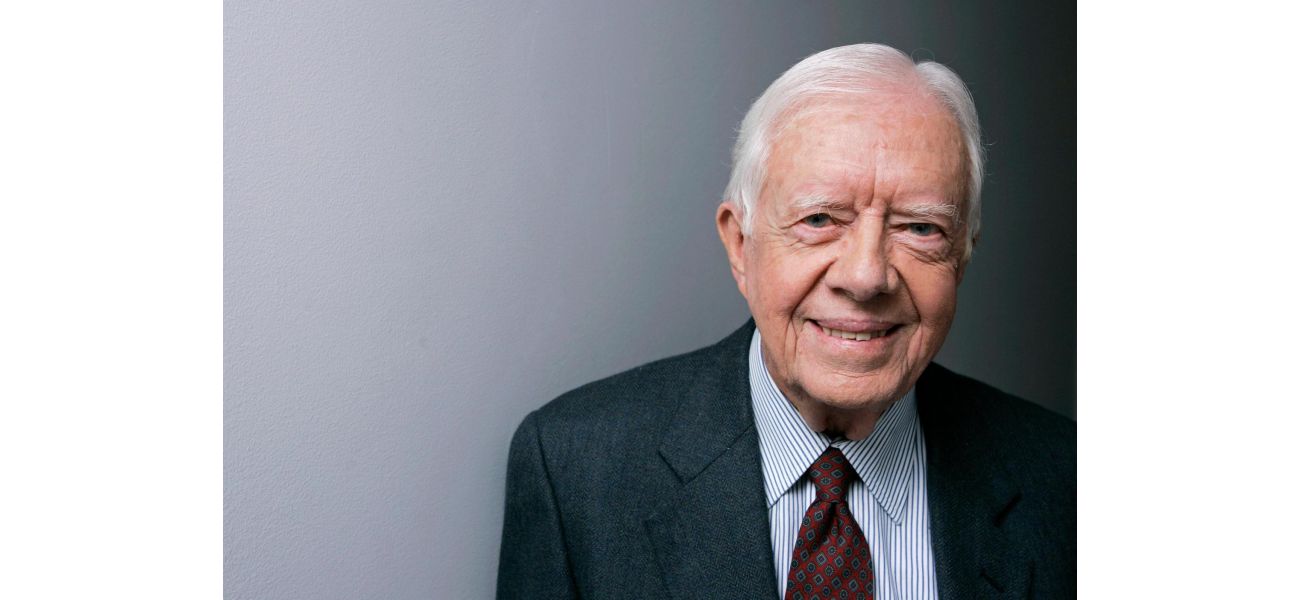Carter passes away: Former U.S. leader and humanitarian, aged 100.
Former US President Jimmy Carter passed away after a tumultuous term and went on to redefine his life as a global humanitarian.
December 29th 2024.

It is with great sadness that we announce the passing of former president Jimmy Carter. He was a peanut farmer who rose to fame in the aftermath of the Watergate scandal and the Vietnam War, ultimately winning the presidency. However, his time in office was tumultuous and he faced a humbling defeat after just one term. Despite this, he went on to redefine his life after the White House as a global humanitarian, leaving a lasting impact on the world. He passed away peacefully at the age of 100 at his home in Plains, Georgia, where he and his late wife Rosalynn had spent most of their lives.
The news of his passing has brought an outpouring of reactions from around the world. President Joe Biden, who considered Carter a dear friend, expressed his grief over the loss of an "extraordinary leader, statesman, and humanitarian." He spoke of Carter's many accomplishments, including his efforts to eradicate disease, promote peace, and fight for civil and human rights. Biden urged young people to study Carter's life in order to understand what it means to live a life of purpose and meaning.
In his own remembrance of Carter, Biden fondly recalled their friendship that spanned over 50 years. He shared how Carter had been a source of comfort to him and his wife Jill when their son Beau passed away in 2015. He also noted their shared experience with cancer, as Carter had battled the disease later in his life. Biden announced that a state funeral would be held in Washington to honor Carter's life and legacy.
Carter's life was a remarkable one, full of many different roles and achievements. From businessman and Navy officer to evangelist and politician, he wore many hats throughout his life. But it was his presidency that truly set him apart. As the 39th president of the United States, he utilized his keen intellect, strong religious faith, and tireless work ethic to tackle the challenges of his time. His no-frills campaign and promise to be honest and transparent with the American people struck a chord with voters after the scandalous presidency of Richard Nixon.
As president, Carter faced many obstacles, including the pressures of the Cold War, the oil crisis, and social upheaval. However, his most notable accomplishment was brokering a peace deal between Egypt and Israel at the historic Camp David summit. This experience would later inspire the post-presidential center that Carter and his wife founded, which became the base for their international peacekeeping and humanitarian efforts.
Despite his many accomplishments, Carter's presidency was cut short after a landslide defeat to Ronald Reagan. However, this defeat allowed for a new chapter in his life. With his newfound freedom, Carter and his wife founded The Carter Center, which became a hub for their work in promoting democracy, public health, and human rights around the world. Their efforts included negotiating cease-fires, monitoring elections, and building homes for the poor through Habitat for Humanity.
Carter's tenacity and determination to make a difference in the world were evident in his approach to life. He often said that his faith demanded him to do whatever he could, wherever he was, for as long as he could. And he lived up to this creed until the very end. Despite his advanced age, he continued to travel to remote villages and meet with people who named their children after him. And even in his final years, he remained active in his community, regularly teaching Sunday School lessons until the COVID-19 pandemic prevented him from doing so.
Carter's legacy will continue to live on, not only in the history books but also in the hearts of those he touched with his remarkable life. He may not have been a perfect president, but his post-presidential work proved that he was a true humanitarian, dedicated to making the world a better place. As Stuart Eizenstat, Carter's domestic policy director, wrote, he may not have been a great president, but he was good and productive, and his accomplishments were realized long after he left office. Carter's life was truly an epic one, and his impact will be felt for generations to come.
The world was struck with sadness as news broke that former President Jimmy Carter had passed away. He was 100 years old, making him the longest-lived American president. He had been in hospice care for the past 22 months before passing away at his home in Plains, Georgia. This was where he and his beloved wife, Rosalynn, who had passed away just a few months before at the age of 96, had spent most of their lives. The Carter Center, an organization founded by the former president, announced his passing on social media, stating that he had died peacefully and surrounded by his family.
The news of Carter's death was met with an outpouring of tributes from around the world. President Joe Biden, a longtime friend of Carter's, expressed his grief at the loss of an "extraordinary leader, statesman, and humanitarian." He praised Carter's work in eradicating diseases, promoting peace, and advocating for civil and human rights. He encouraged young people to look to Carter as an example of living a purposeful and meaningful life.
Biden later spoke about his friendship with Carter, reminiscing about the over 50 years they had known each other. He shared how Carter had been a source of comfort for him and his wife, Jill, when their son Beau passed away. Cancer had affected both of their families, and Carter's empathy and understanding were a source of solace for Biden. The president announced that a state funeral would be held in Washington to honor Carter's life and legacy.
Carter's life was nothing short of remarkable. From a businessman and naval officer to an evangelist, politician, and author, he had worn many hats. He had even taken up woodworking in his later years. But it was his role as the 39th president of the United States that left a lasting impact. A moderate Democrat, Carter had entered the 1976 presidential race as a relatively unknown governor from Georgia. His campaign, which rejected private funding, resonated with the American people after the Watergate scandal and the Vietnam War. He won the election by a narrow margin, defeating the Republican incumbent Gerald Ford.
During his presidency, Carter faced challenges such as the Cold War, volatile oil markets, and social issues like racism and women's rights. However, his most significant achievement was brokering a peace deal between Egypt and Israel, which would later inspire the establishment of the Carter Center. Despite his successes, his presidency was also marred by high inflation and the Iran hostage crisis, which contributed to his defeat in the 1980 election.
After his time in the White House, Carter's life took on a new purpose. He and Rosalynn founded the Carter Center, a non-governmental organization that focused on promoting democracy, public health, and human rights. Carter himself took on the role of an international peacemaker, often traveling to places that others would not dare to go. He was unafraid to speak out against American policies, including the invasion of Iraq and the country's relationship with Israel.
Carter's work at the Carter Center and his relentless efforts to eradicate diseases and promote peace earned him the Nobel Peace Prize in 2002. He continued his humanitarian work well into his 90s, never losing his sense of purpose. He believed that it was his faith that drove him to make a difference in the world, and he lived by the mantra of doing whatever he could, wherever he was, for as long as he could.
While some may have criticized his presidency, Carter's legacy as an ex-president was undeniable. He was a man who lived by his principles, and his work at the Carter Center has had a significant impact on the world. As Stuart Eizenstat, Carter's domestic policy director, wrote in a book, he may not have been a great president, but he was certainly a good and productive one who delivered results. And as President Biden said, the world has lost an "epic American life."
The news of his passing has brought an outpouring of reactions from around the world. President Joe Biden, who considered Carter a dear friend, expressed his grief over the loss of an "extraordinary leader, statesman, and humanitarian." He spoke of Carter's many accomplishments, including his efforts to eradicate disease, promote peace, and fight for civil and human rights. Biden urged young people to study Carter's life in order to understand what it means to live a life of purpose and meaning.
In his own remembrance of Carter, Biden fondly recalled their friendship that spanned over 50 years. He shared how Carter had been a source of comfort to him and his wife Jill when their son Beau passed away in 2015. He also noted their shared experience with cancer, as Carter had battled the disease later in his life. Biden announced that a state funeral would be held in Washington to honor Carter's life and legacy.
Carter's life was a remarkable one, full of many different roles and achievements. From businessman and Navy officer to evangelist and politician, he wore many hats throughout his life. But it was his presidency that truly set him apart. As the 39th president of the United States, he utilized his keen intellect, strong religious faith, and tireless work ethic to tackle the challenges of his time. His no-frills campaign and promise to be honest and transparent with the American people struck a chord with voters after the scandalous presidency of Richard Nixon.
As president, Carter faced many obstacles, including the pressures of the Cold War, the oil crisis, and social upheaval. However, his most notable accomplishment was brokering a peace deal between Egypt and Israel at the historic Camp David summit. This experience would later inspire the post-presidential center that Carter and his wife founded, which became the base for their international peacekeeping and humanitarian efforts.
Despite his many accomplishments, Carter's presidency was cut short after a landslide defeat to Ronald Reagan. However, this defeat allowed for a new chapter in his life. With his newfound freedom, Carter and his wife founded The Carter Center, which became a hub for their work in promoting democracy, public health, and human rights around the world. Their efforts included negotiating cease-fires, monitoring elections, and building homes for the poor through Habitat for Humanity.
Carter's tenacity and determination to make a difference in the world were evident in his approach to life. He often said that his faith demanded him to do whatever he could, wherever he was, for as long as he could. And he lived up to this creed until the very end. Despite his advanced age, he continued to travel to remote villages and meet with people who named their children after him. And even in his final years, he remained active in his community, regularly teaching Sunday School lessons until the COVID-19 pandemic prevented him from doing so.
Carter's legacy will continue to live on, not only in the history books but also in the hearts of those he touched with his remarkable life. He may not have been a perfect president, but his post-presidential work proved that he was a true humanitarian, dedicated to making the world a better place. As Stuart Eizenstat, Carter's domestic policy director, wrote, he may not have been a great president, but he was good and productive, and his accomplishments were realized long after he left office. Carter's life was truly an epic one, and his impact will be felt for generations to come.
The world was struck with sadness as news broke that former President Jimmy Carter had passed away. He was 100 years old, making him the longest-lived American president. He had been in hospice care for the past 22 months before passing away at his home in Plains, Georgia. This was where he and his beloved wife, Rosalynn, who had passed away just a few months before at the age of 96, had spent most of their lives. The Carter Center, an organization founded by the former president, announced his passing on social media, stating that he had died peacefully and surrounded by his family.
The news of Carter's death was met with an outpouring of tributes from around the world. President Joe Biden, a longtime friend of Carter's, expressed his grief at the loss of an "extraordinary leader, statesman, and humanitarian." He praised Carter's work in eradicating diseases, promoting peace, and advocating for civil and human rights. He encouraged young people to look to Carter as an example of living a purposeful and meaningful life.
Biden later spoke about his friendship with Carter, reminiscing about the over 50 years they had known each other. He shared how Carter had been a source of comfort for him and his wife, Jill, when their son Beau passed away. Cancer had affected both of their families, and Carter's empathy and understanding were a source of solace for Biden. The president announced that a state funeral would be held in Washington to honor Carter's life and legacy.
Carter's life was nothing short of remarkable. From a businessman and naval officer to an evangelist, politician, and author, he had worn many hats. He had even taken up woodworking in his later years. But it was his role as the 39th president of the United States that left a lasting impact. A moderate Democrat, Carter had entered the 1976 presidential race as a relatively unknown governor from Georgia. His campaign, which rejected private funding, resonated with the American people after the Watergate scandal and the Vietnam War. He won the election by a narrow margin, defeating the Republican incumbent Gerald Ford.
During his presidency, Carter faced challenges such as the Cold War, volatile oil markets, and social issues like racism and women's rights. However, his most significant achievement was brokering a peace deal between Egypt and Israel, which would later inspire the establishment of the Carter Center. Despite his successes, his presidency was also marred by high inflation and the Iran hostage crisis, which contributed to his defeat in the 1980 election.
After his time in the White House, Carter's life took on a new purpose. He and Rosalynn founded the Carter Center, a non-governmental organization that focused on promoting democracy, public health, and human rights. Carter himself took on the role of an international peacemaker, often traveling to places that others would not dare to go. He was unafraid to speak out against American policies, including the invasion of Iraq and the country's relationship with Israel.
Carter's work at the Carter Center and his relentless efforts to eradicate diseases and promote peace earned him the Nobel Peace Prize in 2002. He continued his humanitarian work well into his 90s, never losing his sense of purpose. He believed that it was his faith that drove him to make a difference in the world, and he lived by the mantra of doing whatever he could, wherever he was, for as long as he could.
While some may have criticized his presidency, Carter's legacy as an ex-president was undeniable. He was a man who lived by his principles, and his work at the Carter Center has had a significant impact on the world. As Stuart Eizenstat, Carter's domestic policy director, wrote in a book, he may not have been a great president, but he was certainly a good and productive one who delivered results. And as President Biden said, the world has lost an "epic American life."
[This article has been trending online recently and has been generated with AI. Your feed is customized.]
[Generative AI is experimental.]
0
0
Submit Comment





